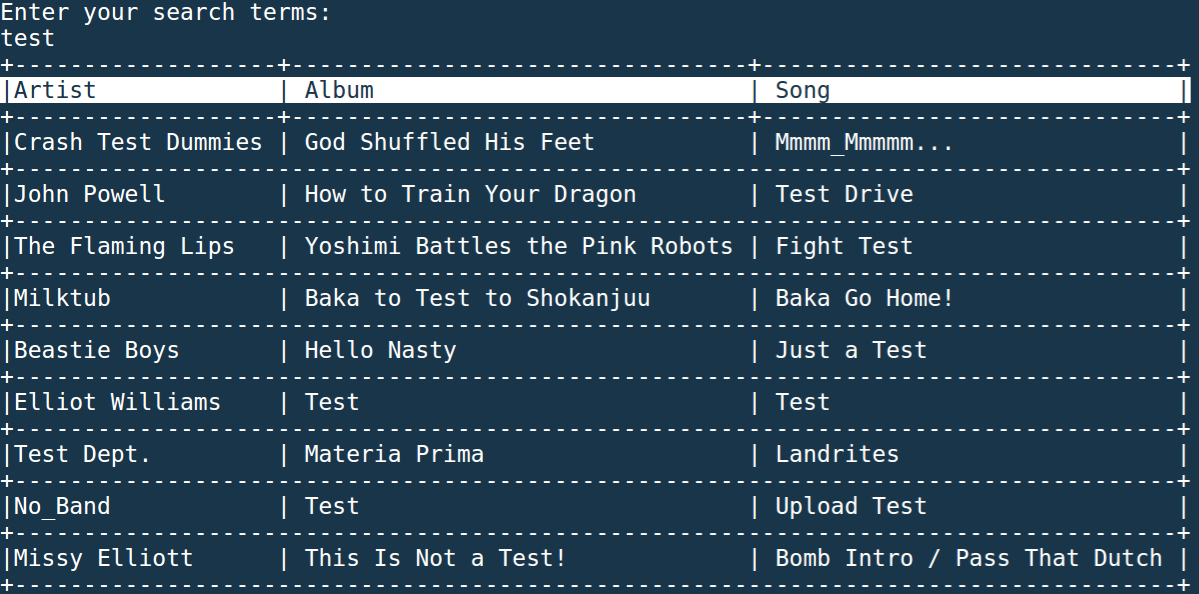I decided to make a Ruby app to search for songs, which uses the tinysong API. Things got really cryptic and weird in the view. I managed to get dynamic tables that adjust to data length, but I feel like there must be a much better way to accomplish this output.
require "rubygems"
require 'json'
require "httparty"
def search(search_terms)
search_string = search_terms.split(' ').join('+')
response = HTTParty.get("http://tinysong.com/s/#{search_string}?format=json&key=API_KEY_OMITTED_FOR_REVIEW")
song_hash = JSON.parse(response.body)
#puts "#{song_hash}"
end
def view_song_search(song_hash)
term_width = %x'tput cols'.to_i # Executes terminal
total_char_limit = term_width - 9
field_limit = total_char_limit / 3
# Sets width of each column to the width of it's highest data.
artist_width = album_width = song_width = 0
song_hash.each do |song|
if song["ArtistName"].length > artist_width then artist_width = song["ArtistName"].length end
if song["AlbumName"].length > album_width then album_width = song["AlbumName"].length end
if song["SongName"].length > song_width then song_width = song["SongName"].length end
end
# Sets the minimum column width equal to header width.
if artist_width < "Artist".length then artist_width = "Artist".length end
if album_width < "Album".length then album_width = "Album".length end
if song_width < "Song".length then song_width = "Song".length end
# If total width is higher than terminal width, reduce total width to fit.
if artist_width + album_width + song_width > total_char_limit
artist_width = album_width = song_width = field_limit
end
# Where things get cryptic.
printf("+%s+%s+%s+\n", "-" * (artist_width + 1), "-" * (album_width + 2), "-" * (song_width + 2))
printf("\e[7m|%-#{artist_width}s | %-#{album_width}s | %-#{song_width}s |\e[0m\n", "Artist", "Album", "Song")
printf("+%s+%s+%s+\n", "-" * (artist_width + 1), "-" * (album_width + 2), "-" * (song_width + 2))
song_hash.each do |song|
# Sets data of each column to not exceed column width.
if song["ArtistName"].length > artist_width ||
song["AlbumName"].length > album_width ||
song["SongName"].length > song_width
artist_name = (song["ArtistName"])[0...artist_width]
album_name = (song["AlbumName"])[0...album_width]
song_name = (song["SongName"])[0...song_width]
else
artist_name = song["ArtistName"]
album_name = song["AlbumName"]
song_name = song["SongName"]
end
printf("|%s%s | %s%s | %s%s |\n",artist_name, ' ' * (artist_width - artist_name.length),
album_name, ' ' * (album_width - album_name.length),
song_name, ' ' * (song_width - song_name.length))
printf("+%s-%s-%s+\n", "-" * (artist_width + 1), "-" * (album_width + 2), "-" * (song_width + 2))
end
end
puts "Enter your search terms: "
view_song_search(search(gets.chomp))
And here is an example of the output:

